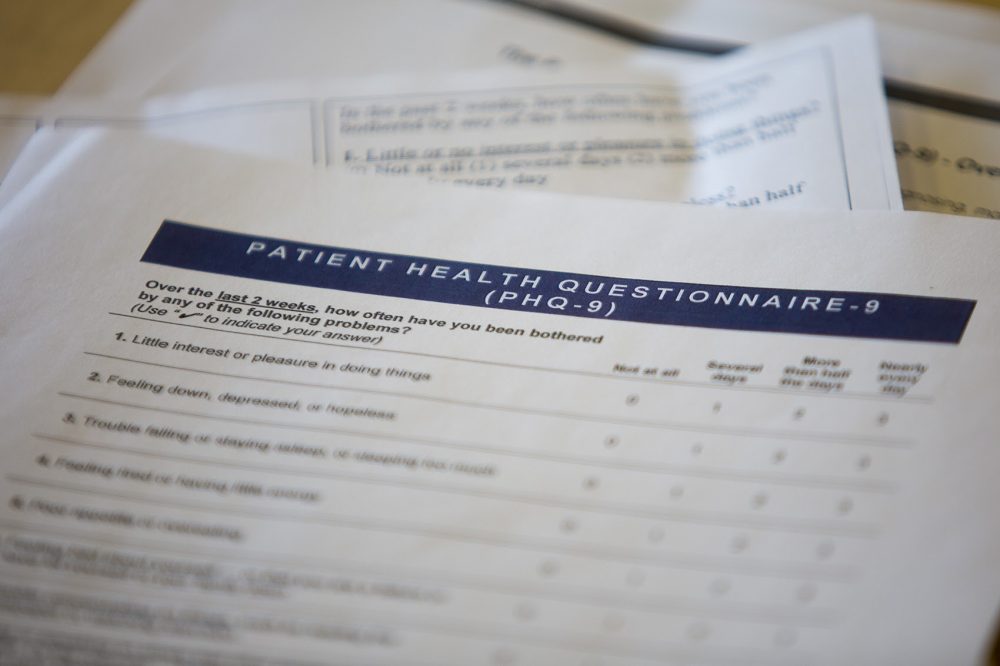Advertisement
Mass. Doctors Are Seeing Effects Of The Election In The Exam Room

In the past two weeks, how often have you been feeling down, depressed or hopeless?
That's one of the questions that primary care practices routinely ask to detect whether you might have diagnosable depression. Normally, it's a highly accurate indicator.
But not since the presidential election in a state that voted heavily for Hillary Clinton — at least not at Women's Health Associates at Massachusetts General Hospital. The number of patients whose answers suggest they're depressed has spiked so dramatically that internist Dr. Elizabeth Roth says she can't rely on it as usual right now, except perhaps as a gauge of election-related distress.
Normally, politics doesn't come up in the exam room, but in recent days, Roth says, whether patients come in for a check-up, a sore throat or knee pain, many need to talk about how they're feeling about the election results. And many in this deep blue state are not feeling good.
"I hear the phrase a lot: 'I feel like I've been punched in the gut, or sucker-punched,' " Roth says. The emotional distress doesn't seem to be translating into physical findings such as higher blood pressure, she says, though it may cause trouble sleeping and fatigue.
For now, it mainly means lengthening appointments a bit so patients can talk, and Roth is adjusting how she uses the depression questionnaire: If she sees signs of depression, she asks, "How were you feeling before the election?"
Cross-Cutting Anxiety
The exam-room expressions of distress are by no means confined to Clinton supporters.
Erica Savino Moffatt, a psychiatric nurse-practitioner at Atrius Health's Harvard Vanguard practice in Concord, says she's seeing a spike in anxiety across demographic lines -- including among Trump supporters who are anxious about how they'll be perceived by Democrats if they express happiness about their victory.
Worries about Thanksgiving cut both ways as well.
"For those who voted Republican, they're worried that their family will be angry at them because they voted for Trump," Moffatt says. "And for those who voted for the Democratic candidate, they're having a hard time thinking about why friends or family may have voted for the Republican candidate. Basically, there's just a lot of fear, and secondarily, so much sadness and lots of questions."
Advertisement
Emotions are running so high, she says, that she's seeing anxiety surge even among clients for whom it's not normally an issue.
"I'm seeing that I need to look at a lot of my clients and really think about: Does this constitute enough of a change that we need to be adjusting medications?" she says. "And certainly, from my colleagues, I have reports that things have been challenging enough for folks that they thought that was the best thing to do — to adjust medications because the stress burden is just higher given the election results."
She's seeing particular anxiety in women with histories of trauma, and responses that include sleeping less, eating more, and "more than one pointed joke about alcohol use that has increased a little more than people really want to be honest about."
Stress Eating Or Loss Of Appetite
Dr. Fatima Cody Stanford, an obesity specialist and researcher at the Weight Center at Massachusetts General Hospital, estimates that more than three-quarters of her patients are coping with election-related stress.
When people are feeling stressed, she says, they tend to "either turn to food for comfort or turn away altogether." She's seeing both. And while those stress reactions may affect health little in the short term, she says that in the longer term, they could lead to higher blood pressure and weight change.
In patients whose heightened stress raises red flags for her, Stanford is spacing check-in visits more closely together to keep a closer eye on them. And her patients have access to Weight Center psychologists, so she can refer those who need it for additional sessions.
"I would shy away from medications at this point," she says. "This is still a high-acuity issue that we would want to talk about first, and coping may improve as time goes on."
Moffatt, the psychiatric nurse-practitioner, expects the high emotions to fade for different people at different times, as the political situation plays out and uncertainty passes. She, too, emphasizes the importance of seeking support.
"The election, overall, brought up a lot of difficult feelings across a lot of demographics, for everyone, no matter who you voted for," she says. "These are really difficult conversations to have, and it's important for people to find a supporter, an empathetic ear. And certainly, if they're continuing to feel distressed, not to be afraid to seek help."
